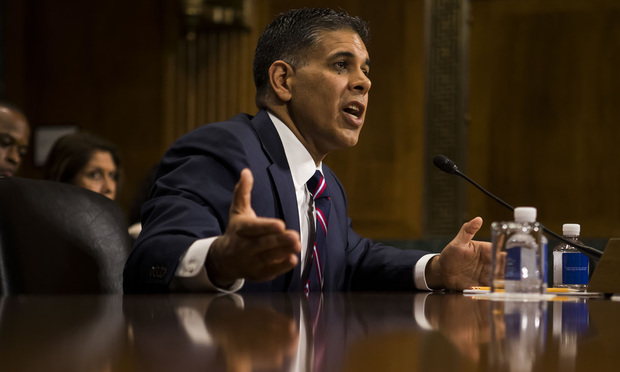Appellate Judges Have a Thing About Citing 'My Cousin Vinny': Merrick Garland Edition
A ruling from D.C. Circuit Chief Judge Merrick Garland is the latest entry in the category "appeals judges who have cited 'My Cousin Vinny'" in an opinion.
March 05, 2019 at 04:32 PM
6 minute read
 Merrick Garland. Credit: Diego M. Radzinschi / NLJ
Merrick Garland. Credit: Diego M. Radzinschi / NLJ
Judge Merrick Garland's opening lines of an opinion Tuesday shouldn't have startled any reader: “In 1992, Vincent Gambini taught a master class in cross-examination. Trial counsel for the National Labor Relations Board and the National Union of Healthcare Workers apparently paid attention.”
Garland's footnote gives it away but, of course, Gambini is the namesake in the classic 1992 comedy “My Cousin Vinny.” Joe Pesci starred as Vinny the lawyer, defending a cousin and a friend who are falsely accused of murder in Alabama.
Garland, the chief judge on the U.S. Court of Appeals for the D.C. Circuit, was particularly struck by Vinny's masterful cross-examination of a prosecution witness, which you can watch here:
Garland's citation to “My Cousin Vinny”—in a ruling that was a win for federal labor regulators—marked the latest instance of a judge who found some moment so compelling as to make note of it in a court ruling. A Wall Street Journal examination in 2017 found judges had cited “My Cousin Vinny” more than two dozen times.
“There are a lot of legal movies that are just kind of nonsense,” Raffi Melkonian, an appellate litigator at Houston's Wright Close & Barger, told the Journal. “For whatever reason, 'My Cousin Vinny' feels real.”
Here are some other times—by no means exhaustive—where federal appeals judges have given a nod to Vinny.
 Judge Amul Thapar testifies in 2017 before the Senate Judiciary Committee during his confirmation hearing for the U.S. Court of Appeals for the Sixth Circuit. Credit: Diego M. Radzinschi / ALM
Judge Amul Thapar testifies in 2017 before the Senate Judiciary Committee during his confirmation hearing for the U.S. Court of Appeals for the Sixth Circuit. Credit: Diego M. Radzinschi / ALM>> Sixth Circuit Judge Amul Thapar, writing last September in the case Doe v. Baum: “Even popular culture recognizes the importance of cross-examination. See A Few Good Men (Castle Rock Entertainment 1992) (depicting one of the most memorable examples of cross-examination in American cinema); My Cousin Vinny (Palo Vista Productions et al. 1992) (demonstrating that cross-examination can both undermine and establish the credibility of witnesses).”
>> Then-D.C. Circuit Judge Janice Rogers Brown, writing in March 2017 in the case United States v. Bronstein: “And yet, in a coordinated fashion, each appellee is alleged to have directed a variation of the same message to the Justices of the Supreme Court and the assembled audience. Their coordinated standing, facing the bench, and messaging indicate the appellees were addressing the court and gallery. Cf. MY COUSIN VINNY (20th Century Fox 1992) (Judge Chamberlain Haller: 'Don't talk to me sitting in that chair! … When you're addressing this court, you'll rise and speak to me in a clear, intelligible voice.'). Viewed objectively, these alleged acts could easily be considered speeches to a public assembly that tended to disrupt the court's operations—conduct covered by §6134's prohibition of 'make a harangue or oration.'”
>> Second Circuit Judge Peter Hall, writing in July 2016 in the case Walsh v. New York City Housing Authority: “To use the apt metaphor coined by Vincent Gambini (one that seems only fitting given the facts of this particular case), a plaintiff may satisfy her burden by building a wall out of individual evidentiary bricks.” In dissent, Judge Debra Ann Livingston took on Hall, writing: “The majority invokes the film My Cousin Vinny in its discussion of the role of circumstantial evidence in Title VII cases. The film might more aptly be cited for the proposition that some individuals, such as Mona Lisa Vito, Vinny Gambino's fiancée who gained expertise in automotives and auto mechanics working in her father's garage, are well qualified despite a lack of formal credentials.”
>> Seventh Circuit Judge William Bauer, writing in September 2009, in the case Sutherland v. Gaetz: “Defense counsel's obstinate behavior and the court's exasperation with it may be reminiscent for some of the contentious interplay between the fictional characters of Vincent LaGuardia Gambini and Judge Chamberlain Haller in the film 'My Cousin Vinnie.' On three separate occasions during trial, Judge Haller held Vinnie in contempt and, each time, made him spend the overnight recess in jail. However, unlike defense counsel here, Vinnie, a New York lawyer struggling to adapt to the rural-Alabama trial setting, found that the accommodations in jail offered the best night's sleep he could find away from the Big Apple. Upon his return to the courtroom, a revitalized Vinnie dismantled the credibility of the State's circumstantial case and cleared the names of the 'two yutes' he represented. (And again we see that life follows art.)”
>> Seventh Circuit Judge William Bauer, writing in April 1997 in the case Bass v. Stolper Koritzinsky Brewster Neider: “Theft, like fraud, is a specific intent crime. To obtain a conviction, the government must prove beyond a reasonable doubt that the defendant intended to deprive the owner permanently of some property. Someone who appears to have shoplifted may then, of course, have a valid defense—that he did not act with the requisite intent. One who walks out of a country store with a can of tunafish in his pocket that he forgot to pay for has not committed theft. The facts, however, may have terrible consequences before the defense can be raised. See, e.g., My Cousin Vinny, at Local Blockbuster Video Rental Store.”
Read more:
Citing 'My Cousin Vinny,' DC Circuit Upholds SCOTUS Protest Ban
In Quoting Profanity, Some Judges Give a F#%&. Others Don't
This content has been archived. It is available through our partners, LexisNexis® and Bloomberg Law.
To view this content, please continue to their sites.
Not a Lexis Subscriber?
Subscribe Now
Not a Bloomberg Law Subscriber?
Subscribe Now
NOT FOR REPRINT
© 2025 ALM Global, LLC, All Rights Reserved. Request academic re-use from www.copyright.com. All other uses, submit a request to [email protected]. For more information visit Asset & Logo Licensing.
You Might Like
View AllShaq Signs $11 Million Settlement to Resolve Astrals Investor Claims
5 minute read
Am Law 100 Partners on Trump’s Short List to Replace Gensler as SEC Chair
4 minute read

Trending Stories
- 1Critical Mass With Law.com’s Amanda Bronstad: LA Judge Orders Edison to Preserve Wildfire Evidence, Is Kline & Specter Fight With Thomas Bosworth Finally Over?
- 2What Businesses Need to Know About Anticipated FTC Leadership Changes
- 3Federal Court Considers Blurry Lines Between Artist's Consultant and Business Manager
- 4US Judge Cannon Blocks DOJ From Releasing Final Report in Trump Documents Probe
- 5White & Case KOs Claims Against Voltage Inc. in Solar Companies' Trade Dispute
Who Got The Work
J. Brugh Lower of Gibbons has entered an appearance for industrial equipment supplier Devco Corporation in a pending trademark infringement lawsuit. The suit, accusing the defendant of selling knock-off Graco products, was filed Dec. 18 in New Jersey District Court by Rivkin Radler on behalf of Graco Inc. and Graco Minnesota. The case, assigned to U.S. District Judge Zahid N. Quraishi, is 3:24-cv-11294, Graco Inc. et al v. Devco Corporation.
Who Got The Work
Rebecca Maller-Stein and Kent A. Yalowitz of Arnold & Porter Kaye Scholer have entered their appearances for Hanaco Venture Capital and its executives, Lior Prosor and David Frankel, in a pending securities lawsuit. The action, filed on Dec. 24 in New York Southern District Court by Zell, Aron & Co. on behalf of Goldeneye Advisors, accuses the defendants of negligently and fraudulently managing the plaintiff's $1 million investment. The case, assigned to U.S. District Judge Vernon S. Broderick, is 1:24-cv-09918, Goldeneye Advisors, LLC v. Hanaco Venture Capital, Ltd. et al.
Who Got The Work
Attorneys from A&O Shearman has stepped in as defense counsel for Toronto-Dominion Bank and other defendants in a pending securities class action. The suit, filed Dec. 11 in New York Southern District Court by Bleichmar Fonti & Auld, accuses the defendants of concealing the bank's 'pervasive' deficiencies in regards to its compliance with the Bank Secrecy Act and the quality of its anti-money laundering controls. The case, assigned to U.S. District Judge Arun Subramanian, is 1:24-cv-09445, Gonzalez v. The Toronto-Dominion Bank et al.
Who Got The Work
Crown Castle International, a Pennsylvania company providing shared communications infrastructure, has turned to Luke D. Wolf of Gordon Rees Scully Mansukhani to fend off a pending breach-of-contract lawsuit. The court action, filed Nov. 25 in Michigan Eastern District Court by Hooper Hathaway PC on behalf of The Town Residences LLC, accuses Crown Castle of failing to transfer approximately $30,000 in utility payments from T-Mobile in breach of a roof-top lease and assignment agreement. The case, assigned to U.S. District Judge Susan K. Declercq, is 2:24-cv-13131, The Town Residences LLC v. T-Mobile US, Inc. et al.
Who Got The Work
Wilfred P. Coronato and Daniel M. Schwartz of McCarter & English have stepped in as defense counsel to Electrolux Home Products Inc. in a pending product liability lawsuit. The court action, filed Nov. 26 in New York Eastern District Court by Poulos Lopiccolo PC and Nagel Rice LLP on behalf of David Stern, alleges that the defendant's refrigerators’ drawers and shelving repeatedly break and fall apart within months after purchase. The case, assigned to U.S. District Judge Joan M. Azrack, is 2:24-cv-08204, Stern v. Electrolux Home Products, Inc.










